By GivingWay
The tourism industry can be an incredible source of income for many people and communities around the world. Unfortunately, it can also lead to serious damage for the environment and dramatic changes for certain cultures. Sustainable travel means being more thoughtful while planning trips and traveling, to make responsible decisions and reduce your footprint. Beyond preserving the environment, traveling sustainably also means being aware of the local culture and economy, and the effect that outsiders have when visiting.
Cambodia has become a popular travel destination and has also become the victim of the negative aspects of the tourism industry. Because of the dark and violent history of the country, the rebuilding process is ongoing and the culture is still being reshaped. While many tourists, companies, and individuals may be knowingly and unknowingly harming the culture and environment in Cambodia, there are many eco-friendly and culture friendly choices travelers can make to prevent being a part of the problem and to raise awareness about being a part of the solution instead. Planning a trip to Cambodia can quickly turn into a more responsible one by choosing sustainable options and solutions.
Want to travel sustainably in Cambodia? Check out these 15 tips below.
1. Learn the Language
Immersing yourself in the culture of the area you’re visiting starts before you ever get on the plane. Before traveling to any location, take some time to learn a few key words and phrases to use while you’re away. This shows that you respect the people and the culture, and can help you out when you’re lost, hurt, or just trying to make conversation with locals. Khmer is the official language of Cambodia. Before you visit the country, learn how to say the basics: hello, please, thank you, where is…, and help. You can find recordings of the words online to help you practice pronunciation. Find a small notebook to carry with you and write down the phonetic spelling of the words to help you along the way when you arrive.
Here are some of the basic words and phrases in Khmer to learn before you head off:
- Hello – Jum reap sou (formal) or Sou sdey (informal)
- Good bye -Jum reap leah (formal) or Leah hi (informal)
- Yes – Baht (for men), Cha (for women)
- No – Oht tey
- Thank you – Ah kun
- Sorry – Sohm tou
- How much is this? – Tah ni thliy pun mann?
- Expensive – Thliy
- Where is…? – (Name of location), nouw ey na?
2. Be Aware of the Water Issue
Do some research to find out what environmental issues are a major concern in the area you’re traveling to. In Cambodia, access to clean water is a big issue and approximately 25% of the population lacks access to safe water. Tourism only adds to this problem as tourists tend to consume far more water than locals. You can take steps to address this problem when you’re looking for accommodations. Avoid hotels with pools, which waste water every day, and visit beaches instead. Look for places that have a policy in place for saving water. If you’re unsure, make a phone call or send an email. The response you get will let you know if the owners are serious about supporting water conservation efforts.
3. Enjoy the Local Cuisine
One of the best things about traveling to a new place is experiencing the food. Choosing where you’ll eat is an incredibly important part of sustainable travel. Avoid chain restaurants and choose to support local businesses instead. You’ll find plenty of locally owned spots for breakfast, lunch, and dinner throughout Cambodia which serve dishes made with local sources and fresh ingredients. You’ll be able to enjoy delicious meals while supporting families and the community.
When eating in Cambodia with locals – try to remember to eat with your right hand. Culturally, the left hand is used for “dirty tasks” and it may be considered rude to use it when eating with locals.
accommodations. Avoid hotels with pools, which waste water every day, and visit beaches instead. Look for places that have a policy in place for saving water. If you’re unsure, make a phone call or send an email. The response you get will let you know if the owners are serious about supporting water conservation efforts.
4. Skip Hotels, Stay in Homes
One of the best ways to fully immerse yourself in a new culture is by joining a family in their home. Consider Cambodian home stay programs for the opportunity to skip a night or two in a hotel and stay in a home with a family instead. The money you’ll spend on the accommodations will go directly to the family or will support a community project. Be sure to choose a reputable company and find out where your money will go. Be sure to acknowledge local customs, like removing your shoes before entering a home, when staying with a family.
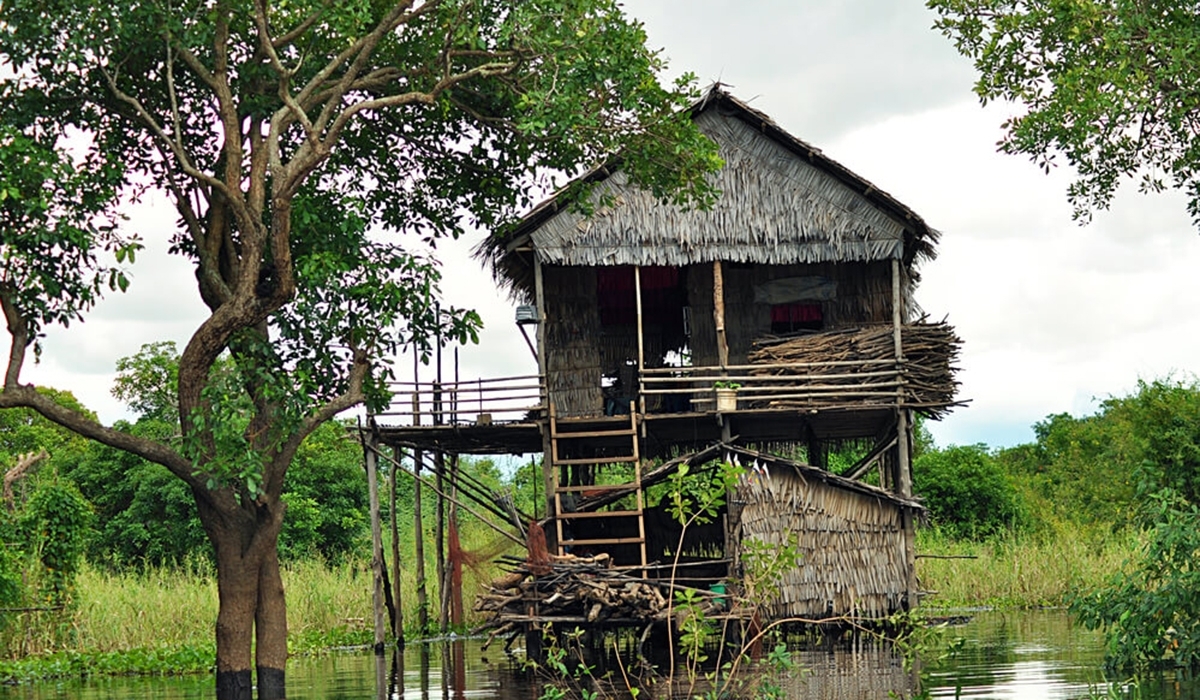
5. Choose Safe Hotels
If you do choose to stay at a hotel during your stay, do some research before making reservations. Human trafficking is a serious problem in Cambodia and hotels are a hub for child exploitation. Organizations like ChildSafe are working hard to address human trafficking and tourists can help by choosing hotels approved by the organization. You can also visit the ChildSafe website to learn more about what to do if you see suspicious activity while traveling.
6. Look for Heritage Friendly Locations
Because of Cambodia’s dark past, many of the cultural symbols and artifacts have been taken away from the country. When planning which attractions and sites you’d like to visit, a great step on the way is to read up on the history of these places. Becoming more aware travelers, and knowing the whole story of a certain place, can be an excellent way to become a more responsible and sustainable traveler. Understanding the significance of a certain touristic attraction can be as meaningful as deciding whether it is worth the visit, or if it is more important to leave unvisited (so as to promote the preservation of this place).
The Heritage Foundation is working to preserve the country’s culture and those at the organization have labeled certain sites as being Heritage Friendly. Look for the logo as a sign that the location is helping the cause and working to keep the Khmer culture intact. These locations can be spotted all over the country. Buying tickets or making donations at Heritage Friendly sites puts your money back into the local economy and helps to keep cultural locations intact.
When visiting popular tourist sites in Cambodia, such as the Angkor Wat temples for example, it is important to be mindful of the impact each visit can have on these heavily visited places. In fact, the temples receive so many visitors each year that at times it seems all the preservation work just cannot keep up! In order to minimize harm during your visits to these temples, be a responsible and mindful visitor. Some tips to keep in mind include following visitor guidelines and paying attention to restricted areas, not littering or buying artifacts that should not be sold, and being mindful of the places you choose to sit, climb, touch, and lean.
accommodations. Avoid hotels with pools, which waste water every day, and visit beaches instead. Look for places that have a policy in place for saving water. If you’re unsure, make a phone call or send an email. The response you get will let you know if the owners are serious about supporting water conservation efforts.
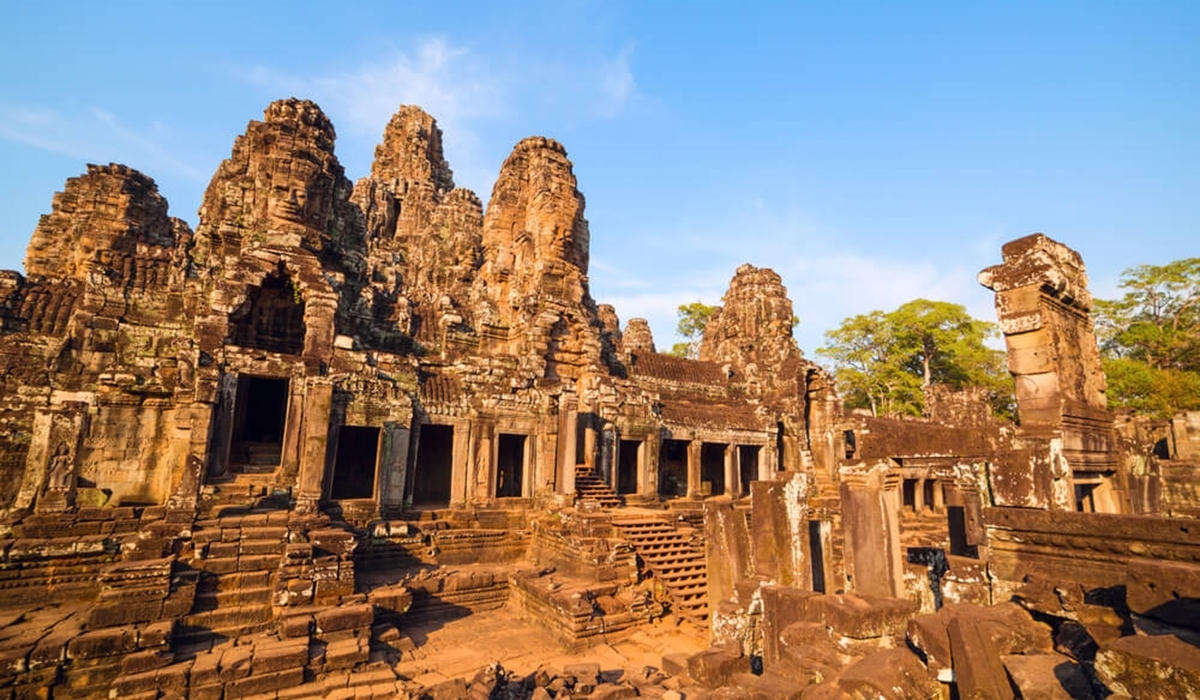
7. Be Aware of Orphanages
Those who volunteer while traveling abroad are often drawn in by the idea of helping children, especially those in orphanages. Unfortunately, many have taken advantage of this desire to help children and have opened fake orphanages as a money-making scheme. Keep in mind that if you see children being led through town during the day, they should be in school or playing with friends, not asking for money from strangers on the street. Giving money to these organizations could potentially mean giving money to the criminals who run them. If you do have a desire to work with children, look for nonprofits that are community-based and have projects that promote children staying in their local communities.
8. Work with Cambodian Nonprofits
If you do want to volunteer while you’re traveling, choose a reputable organization before leaving home. Plan before you arrive, to be sure that you’ll be working with an organization that can use your help. Find out how they help the community and how they use financial donations. If you can get in contact with the organization before your visit, you might also want to find out if there are any items you can bring with you. You might just find that you have a connection with an organization and you can continue to support their mission even after returning home from your adventure.
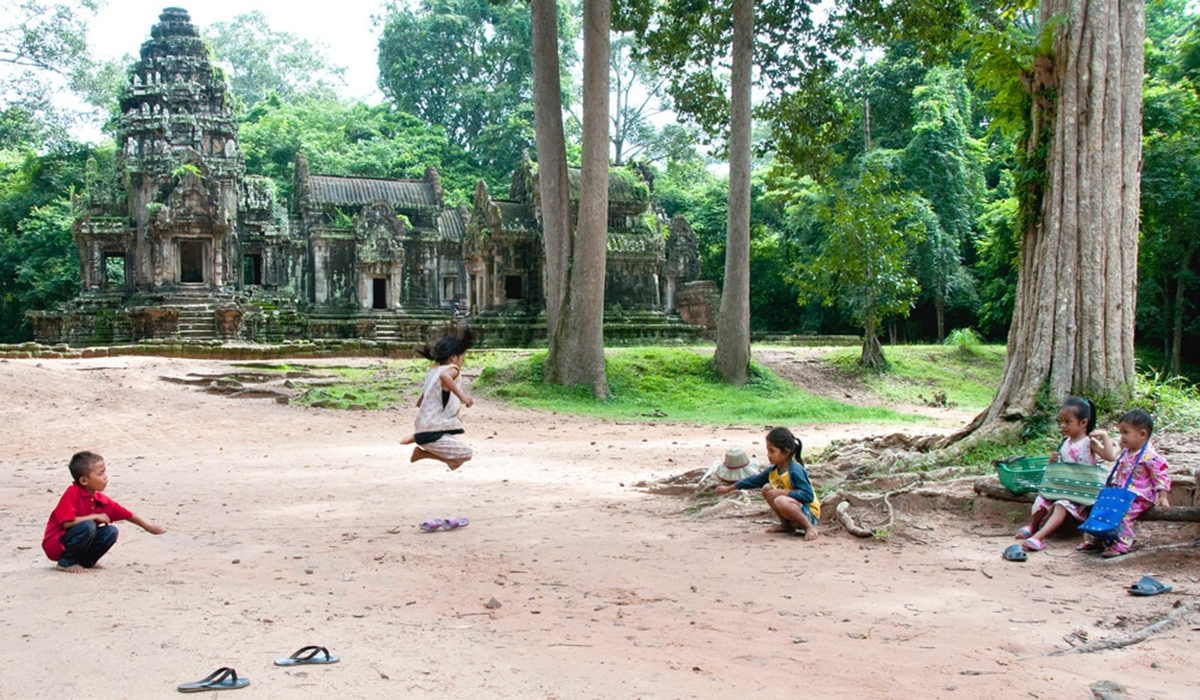
9. Shop Local
Sustainable travel goes beyond your time spent in the country. It includes the items you choose to purchase and bring home with you as well. Because labor is cheap in Cambodia, there are many businesses that take advantage of workers and make a profit on items made with essentially slave labor. Avoid buying items from children on the street, as the money is immediately taken by these unethical business owners. Look for locally made items and shops run by locals. You’ll find beautiful bags, jewelry, and scarves to take home for friends and family, while supporting the artists and the community. Think about the stories of local artists that you’ll be able to share when you get home and hand out souvenirs. Whatever you do, make sure you do not buy any local artifacts – these are incredibly valuable to the history of Cambodia and it is important to not fuel this demanding market. It is possible to buy replicas of such artifacts, but only if they come with a legitimate replica certificate. If it is not possible to receive the certificate, skip out on buying these gifts all together!
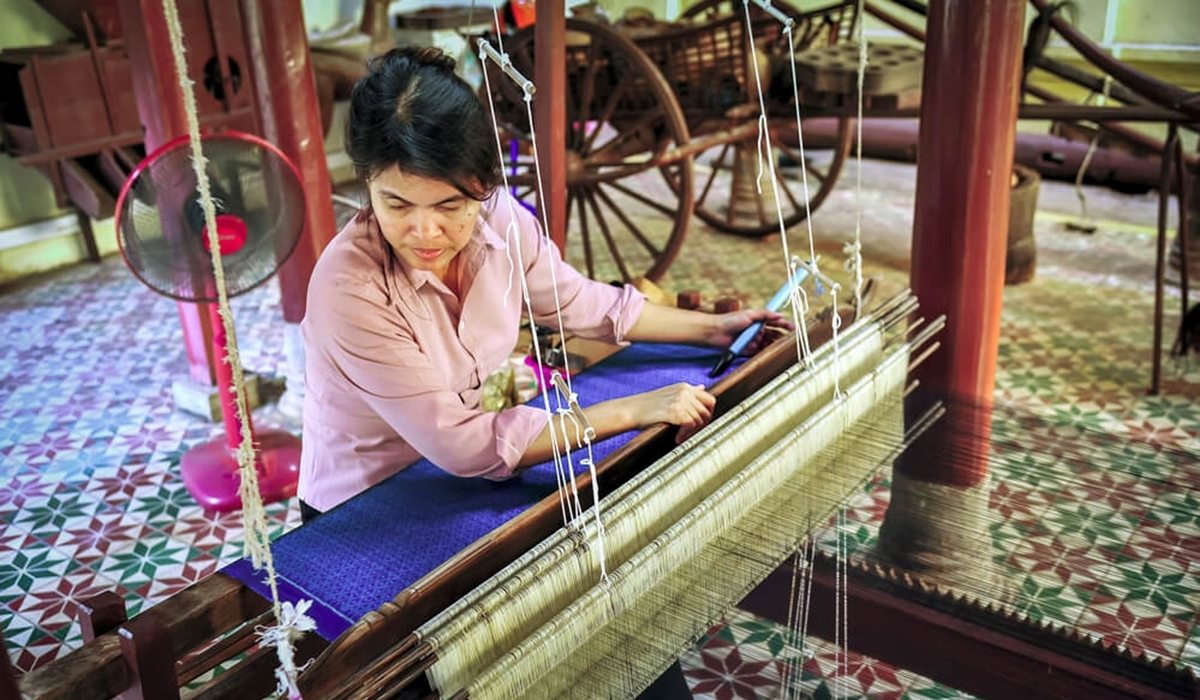
10. Pack Wisely
When choosing what you’ll pack and wear in Cambodia, think about the places you’ll be visiting and local customs. If you’ll be visiting any religious sites, including the incredible temples found throughout the country, women should cover their shoulders and knees. In some areas, you may be able to wear shorts and sleeveless tops, but many areas are much more conservative. If you’re unsure about what you’ll be doing and where you’ll be going during the day, keep a light scarf or sarong with you. It can be used to cover yourself in a pinch if you visit a temple, religious area, or a more conservative town. Keep the values and traditions of the people of the country in mind when visiting.
11. Reduce Your Waste
A major issue with tourism is the amount of waste that gets left behind. As the population of Cambodia grows and tourism continues to become a major industry, waste management is becoming a big problem that should be addressed with sustainable travel. Opt for reusable water bottles and shopping bags. When traveling to major cities in Cambodia, such a Siem Reap and Phnom Penh, tap water is generally safe for drinking. Although, traveling to the countryside means you’ll need to be prepared with a water purifier or processor to avoid the necessity of buying bottled water. In general, try to buy as few single-use water bottles as possible and when you do, be sure to dispose of the bottle properly instead of littering. You’ll notice that trash cans are limited, so be aware that you may need to carry trash with you for a while before finding a place to throw it out. When you leave, be sure not to leave your belongings and trash behind. Though there are still no clear plans for nationwide recycling systems, there are some dedicated organizations that are working hard to fight the waste.
12. Respect the Locals
An area that’s often overlooked, but just as important as knowing local customs, is knowing which gestures are the norm and which should be avoided. For example, the head is considered the highest part of the body and the feet the lowest. That means that you should never touch someone’s head and you should never point your feet toward religious relics. Sompeyar is a commonly used gesture in Cambodia and looks like a small bow with your hands together at your chest. The gesture is a sign of respect. It’s also worth noting that public displays of affection are frowned upon in many areas, especially religious centers.
13. Travel Like a Local
Public transportation is a great way to get around a new area, as the money you spend will go back to the community and support local infrastructure. Tuk tuks are a good way to get around and you’ll find bicycles for rent in the cities. On the other hand, one method of transportation that should absolutely be avoided is elephant rides. Tourists often jump at the opportunity to have their photo taken on an elephant, but the practice is a well-known form of animal abuse. The animals are trained in dangerous conditions and are abused throughout the process. Instead of taking part in the elephant rides, consider getting in touch with an organization that helps the animals and volunteer or financially support them during or after your trip. Click here to learn more about how you can be an ‘elephant-friendly’ traveler.

14. Hire Local Tour Guides
Because tourism is a booming business in Cambodia, there are many tour guides to choose from. Finding a local tour guide means that you’ll learn the history of this unique country from someone who lives there and knows the ins and outs of each location. Get to know your guide and be sure to ask them for recommendations of places to visit and restaurants to try out. In many cases, tourists are known for being disrespectful to their guides. Sustainable travel includes showing respect to those who live in the area you’re visiting, including those you’ve hired to show you around the area.
15. Meet the Monks
In a country known for its temples, monks are a big part of the culture of Cambodia. It’s important to show respect in every religious area you enter and that should include showing respect to the monks. Never touch a monk or his robes. Be aware of prayer times throughout the day and take care to not interrupt monks while they’re praying. You should never take photos of the monks without their permission, especially during a time of prayer.
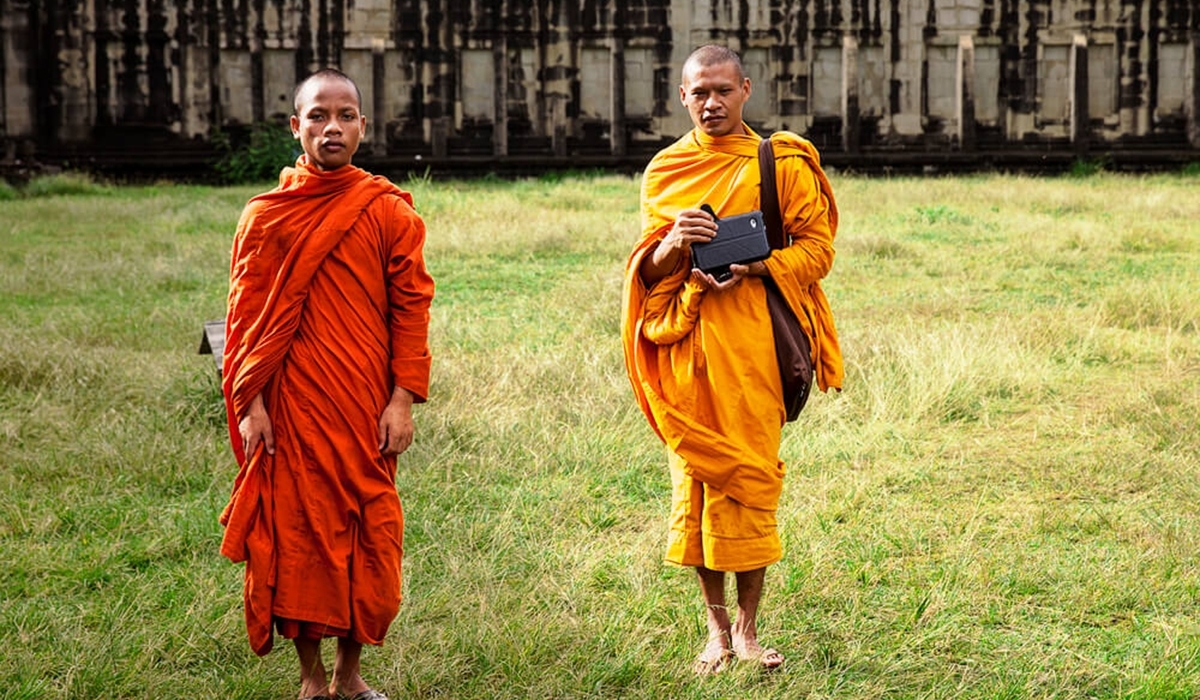
The tips above won’t require much extra planning or cost extra money. They’ll simply help you to enjoy your trip without causing damage along the way. While these tips are helpful and will get your started in your travel planning, sustainable travel doesn’t stop here. While planning your trip, you’ll probably learn much more about Cambodia and find out about the problems the country is facing and what can be done to help. As a tourist, you won’t be able to solve all of the problems, but being a responsible traveler is a good place to start.
Cambodia is an incredible country with a rich culture and beautiful sites to see. Engaging in sustainable travel is an excellent way to immerse yourself in the unique culture and experience a new area while keeping the interests of the culture and the environment in mind. Take the time to get to know the locals, engage in the culture, and keep sustainability in mind along the way. You’ll be sure to come home with more than just a few great snapshots after your incredible Cambodian adventure.
GivingWay is a FREE platform that connects between worldwide travelers and nonprofits seeking volunteers in a simple and direct manner. In an industry heavily dominated by expensive middlemen, GivingWay believes volunteering should be accessible to all and is leveling the playing field by cutting out all agents and agent fees. With over 600 active organizations from over 80 countries worldwide, GivingWay makes it possible for even the remotest of organizations to find and to be found by international volunteers. As a social impact company GivingWay believes that by enabling direct dialog between volunteers and organizations, the matching of skills and needs is enhanced and impact to all involved is maximized. www.givingway.com
Quick Links
Facebook Group
Share sustainable travel experiences, exchange tips for better travel, and get inspired!
Member Benefits
Browse exclusive member benefits including savings on hotels, tours, travel gear and other travel-related products and services.
